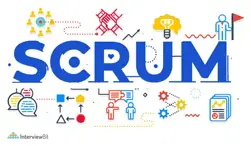Scrum Master Jobs
1. What is Scrum Master?
Scrum is defined as an Agile project management framework used to implement complex software development projects. Many large, well-known companies have adopted Agile/Scrum approaches such as Golden Gate, Prudential, Bosch, MSB, NAL etc.
A Scrum Master is responsible for guiding the Scrum team, which includes the Scrum Master, Product Owner, and Development Team, to implement the Scrum process and framework effectively. Specifically, the Scrum Master helps remove impediments, facilitate meetings like the Daily Scrum, Sprint Planning and Retrospectives, coach the team in Scrum values/practices, and ensure transparency and process adherence. They act as a servant-leader, empowering self-organizing teams while also protecting them from outside interferences to help maximize productivity and deliver results.

2. Key responsibilities of a Scrum Master
-
Ensuring all team members clearly understand the Product Owner's requirements and goals to develop the product accordingly.
-
Facilitating an effective working environment for the team by providing necessary tools and resources.
-
Identifying each member's strengths and helping distribute work reasonably based on their skills. Also supporting members to overcome weaknesses.
-
Removing any impediments or roadblocks faced by the team during a Sprint.
-
Conducting regular Daily Stand-up meetings for status updates and progress monitoring.
-
Organizing and leading planning meetings, retrospectives and reviews.
-
Coaching the team on Scrum practices and values like self-organization and cross-functionality.
-
Ensuring transparency of processes and adherence to the Scrum framework.
-
Protecting the team from external interferences and distractions.
-
Reporting progress to management and stakeholders.
3. Differences Between a Scrum Master and a Project Manager

Scrum Master and Project Manager are two crucial roles in project management, each with distinct functions, responsibilities, and approaches to work. Their main focus areas and methodologies differ significantly. Below is a detailed comparison of these two roles:
Scrum Master
Framework: Operates within Agile projects, specifically following the Scrum framework.
Focus: Ensures the Scrum team adheres to Scrum principles and practices.
Role: Does not manage the project in a traditional sense; instead, supports and leads the team.
Team Support: Helps the Scrum team self-organize and work efficiently.
Impediment Removal: Eliminates obstacles that impede the team's progress.
Environment: Creates a conducive working environment and fosters team collaboration.
Scrum Events: Ensures Scrum events (such as Sprint Planning, Daily Scrum, Sprint Review, and Sprint Retrospective) occur as prescribed.
Project Manager
Framework: Can operate within various management frameworks, including traditional (Waterfall) and Agile.
Scope: Manages all aspects of the project, including planning, execution, monitoring, and closing.
Responsibility: Responsible for meeting project objectives, including scope, time, cost, and quality.
Planning: Develops detailed project plans and sets timelines.
Budget: Manages the project budget and resources.
Progress Monitoring: Oversees and controls project progress to ensure timely and budget-compliant completion.
Risk Management: Manages risks and changes within the project.
Reporting: Reports project progress to stakeholders.
4. How to Become a Professional Scrum Master

There is a lot to learn if you want to become a professional Scrum Master. You can enroll in short courses and enhance your skills through specialized workshops. Most importantly, regular practice is essential to improve your ability to build effective teams and processes. Below are some steps you can take to enhance your knowledge and skills on your career path to becoming a Scrum Master.
Educational Background: Obtain a degree in Information Technology, Business, or a related field from universities or colleges.
Courses and Workshops: Participate in courses and workshops on Agile and Scrum to master both the theory and practical applications.
Scrum Fundamentals: Understand the foundational knowledge of Scrum, including key terms, concepts, frameworks, and basic terminology to integrate methods safely.
Achieving Recognized Certifications:
- Professional Scrum Master™ I (PSM I) Certification by Scrum.org
- Certified ScrumMaster® (CSM) by Scrum Alliance
- Scrum Master Certification by Scrum Inc.™
Community Engagement: Join forums, discussion groups, and Agile events to connect with other professionals and continuously learn from the community.












